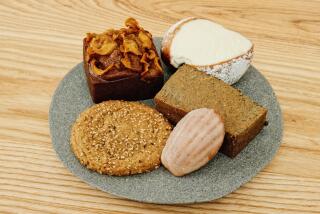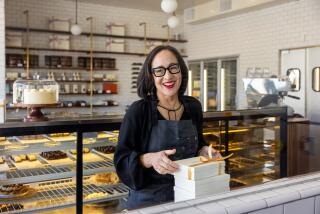Want to win ‘The Great British Baking Show’? You’ll need her help
If you feel overwhelmed by grocery shopping, try being the home economist on “The Great British Baking Show.”
Faenia Moore has been with the competition reality series, which wraps its latest season Friday on Netflix, since the beginning. And it’s her job to track down, buy and organize all the ingredients and equipment used by the bakers on the show (known as “The Great British Bake Off” in the U.K.), from kitchen staples (butter, flour, eggs) to more niche delicacies (pomegranate molasses, Sicilian lemon oil).
Moore began her career as a chef in London before moving into food styling for television. One day about 10 years ago, she got a call: “‘We’re starting this new program called “Bake Off” and would you like to come in for an interview?’” she recalled by phone from Ireland, where she was visiting family.
Though she was not an expert in baking at the time, Moore says she is “absolutely jam-packed” with baking knowledge. “As you can imagine, I really get asked to make wedding cakes quite a lot,” she adds. “But most of my friends are married now, so I might be off the hook.”
“The Great British Baking Show” has angered Goths everywhere — and taken another of its increasingly gimmicky turns — by eliminating fan favorite Helena Garcia.
What does your job entail?
Firstly, I am involved in the casting. We must interview 400 to 500 people for each year. The baker-to-be will bring in something that they have baked at home and we chat [with] them to get a feel for their personality. My role is to make sure they know what they’re talking about, baking-wise.
What kind of questions do you ask?
It’s the same with each person, because it’s all about being fair. “Have you made choux pastry?” “Do you know why puff pastry puffs up?” There are various technical questions. It’s quite quick, the chat — under 10 minutes. We really like learning about how people have learned how to bake. Loads of people will say, “My grandma taught me how to bake.” A lot of people will say they went through something that wasn’t particularly brilliant and baking helped them. And then also people really love giving. That’s the thing about baking: You put a lot of love into this thing and then you give that love to someone you love. It’s all pretty nice, basically.
On the actual show, I maybe go into the office two months before we start filming and I work very closely with a food producer. The food producer [works] with the director and the cameras to get the story. My job is, I go through all of the recipes and I basically source and buy and organize all the bakers’ ingredients and all the equipment they need. When there’s 12 bakers, it’s quite a lot of information. I have a million lists.
I’m super, super organized. It totally depends year to year and person to person. Some people are really traditional — they might be making a lemon cake and they will flavor it with fresh lemon zest. Whereas somebody else might want Sicilian lemon oil or some obscure thing from the internet.
How specific can you get? If someone is like, ‘I only use this brand of Sicilian lemon oil,’ is that allowed?
That is also the thing about baking, that I’ve learned very quickly. Say, for instance, I was making a Victoria sponge, some butter might work better than some other butter. Then, depending on the person, some people might say, “I would like my flour from this shop, I would like my eggs from this shop, I would like my butter from this shop.” But it’s totally fair enough. That’s what they’ve practiced with, and our mantra is always to do as near as you can to what you have practiced at home.
Some people do wing it sometimes, they don’t practice, and that again is a personality thing. I would always advise the bakers, sometimes there might be some equipment available they haven’t used before and you can see that they’re tempted to use it. And I usually say, “Do what you do at home. If you used a wooden spoon at home, use a wooden spoon here.”
What about the day of filming?
I work in a team of people. There’s three other people in home-economics team. I think in America you call it the culinary department. Before we start filming, we go to each baker. If you are a baker, I would say, “Good morning, Meredith.” I’d say, “The first thing we’re going to do is run through a copy of your recipe.” I will literally pick up each thing, “Here’s your sugar, here’s your self-rising flour, here’s your ground cinnamon.” I will pick up each and show it to you. It is the time for the baker to say, “Oh, actually, I want a different kind of cinnamon.” It’s time to go through everything step by step.
When we’ve gone through all the ingredients, I then go through the method in the recipe. It is minutiae, but it needs to be. I will say, “You’re going to need a bowl. Here is a bowl. Here are your measuring spoons.” I also have to do all the health and safety stuff. “Don’t chop your hands off with a knife.” “Use an oven glove when you take things out of a hot oven.” Sometimes people are really nervous — when I’m nervous, a lot of common sense can fly out the window.
It’s a funny one, because I can’t help the bakers, because it’s a competition. If they’re making a ganache and it’s split for the thousandth time, though it does break my heart to see it, I can’t tell them what’s going wrong. However, I can say, “Would you like more ingredients? It’s going to be OK,” and just be supportive. It’s a fine line. I can be helpful to a point, but not instructive.
You must keep lots of extra ingredients on hand.
What you see on camera is our main tent. Our prep kitchen is behind the sunburst — the big sideboard/cupboard thing. There’s about a bazillion kilner jars with the snappy lids.
For every food coloring you can imagine, and spice and eggs and butter and flour and sugar, we just have them all ready in jars, all pre-labeled and ready to grab. One of the very common lines is, “Meredith is starting again. She needs all her ingredients again.” And then all the butter has to be at the right temperature. It’s always about trying to be one step ahead. It would be helpful to be clairvoyant in my job.
Do contestants submit all their recipes ahead of time?
They do it in chunks. They ask for the first couple of shows in advance. It’s more of a drip feed after that. [The contestants] actually have to write these recipes. They can’t just lift them off the internet. They’ve got to practice that recipe. If you’re going on “Bake Off,” you want it to be really, really good and that you’ve done the best of your ability. It might take three or four goes to get it bang-on.
What’s the weirdest request you’ve ever gotten?
I’m going to answer this in a roundabout way. Because “Bake Off” has been on the TV for a decade, it is extraordinary how much it has influenced availability of weird ingredients.
In [Season] 2 or 3, I woke up in a cold sweat in the middle of the night and I just said, “Pomegranate molasses!” Obviously, my subconscious had been working during the night and I had remembered it in a dream or something. It was like gold dust to find, and I did actually get my hands on it somehow. But now you can buy it in a normal supermarket in the U.K. The baking section[s] of the supermarkets are just huge now. You can buy things like starred nozzles and piping bags. It’s amazing how it can have that knock-on effect.
Then, I think this was in [Season 1], somebody had requested freeze-dried raspberries. They had been ordered and they didn’t arrive in time. There was a time you could get Special K with freeze-dried raspberries. I had a light-bulb moment. This person wanted 5 grams of freeze-dried raspberries. They’re extremely light, so my assistant and I went through about 20 packets in order to get these coveted freeze-dried raspberries. And now you can get those in basically every supermarket in the U.K.
Are there other trends you’ve seen in what people are baking?
Everything melds into one big “Bake Off” lump. There was one year people were just crazy about pistachio nuts. I think it was this year, people were just crazy about edible flowers. One person ordered edible flowers, and everyone was like, “Oh, that’s a good idea.” I had the direct hotline to “flower woman,” as she is known in my mobile phone. She’s just amazing. She’d put these things in the post last minute.
Then, one year, they went through a phase of asking for lots of different essences. And I remember somebody wanted pineapple extract, which is not that easy to find. I found a really good-quality one, and I was really pleased with myself. And the person said, “Actually, I got this really cheap one from our local corner shop.” I was like, “Oh, well, fine.” When this person did use the not-so-fancy-pants extract it tasted really good. So you never know.
Are ingredients ever too expensive? Do you ever have to draw the line?
We’ve never done that. I do remember, a couple of years ago, somebody was making a Black Forest gateau and they wanted cherries. The thing about fruit, one week they’ll be all over the place and then the day after, you will not be able to get them anywhere. What I ended up doing, and I was cringing, was buying cherries from Harrods in London and they cost something like 60 pounds for 500 grams. We obviously don’t do that all the time. You want to be vaguely sensible.
A question I’m sure you’re asked all the time, but what do you do with leftovers?
This year, somebody who worked in the company had set up a local food bank and we sent off about 10 crates of food to this food bank. All the cakes and stuff, the majority is eaten by the crew, actually. As you can imagine, it’s complete hell for waistline situations. There’s 40 or 50 of us on site. After the judges have tasted everything, we make up a little tray for the bakers to actually taste what they have baked, and what others have baked, and then the rest goes to the crew. It is amazing how it vanishes. Usually somewhere in the show there will be savory day, and everyone gets really excited about the smell of onions or melted cheese because everyone’s really sugared up.
What if your bake doesn’t get eaten? It must be really bad.
That is something that we’re really, really aware of, so it’s always done behind the scenes. Can you imagine if someone else’s cake got demolished, and my cake was untouched? I’d feel pretty crummy. I don’t think there’s been a case where something has been inedible.
Despite what [judge] Paul [Hollywood] says.
He’s a hard taskmaster. Paul has high standards. But also he is a judge. I think he’s fair. I think the judges are fair, they really care for the bakers.
More to Read
The complete guide to home viewing
Get Screen Gab for everything about the TV shows and streaming movies everyone’s talking about.
You may occasionally receive promotional content from the Los Angeles Times.






